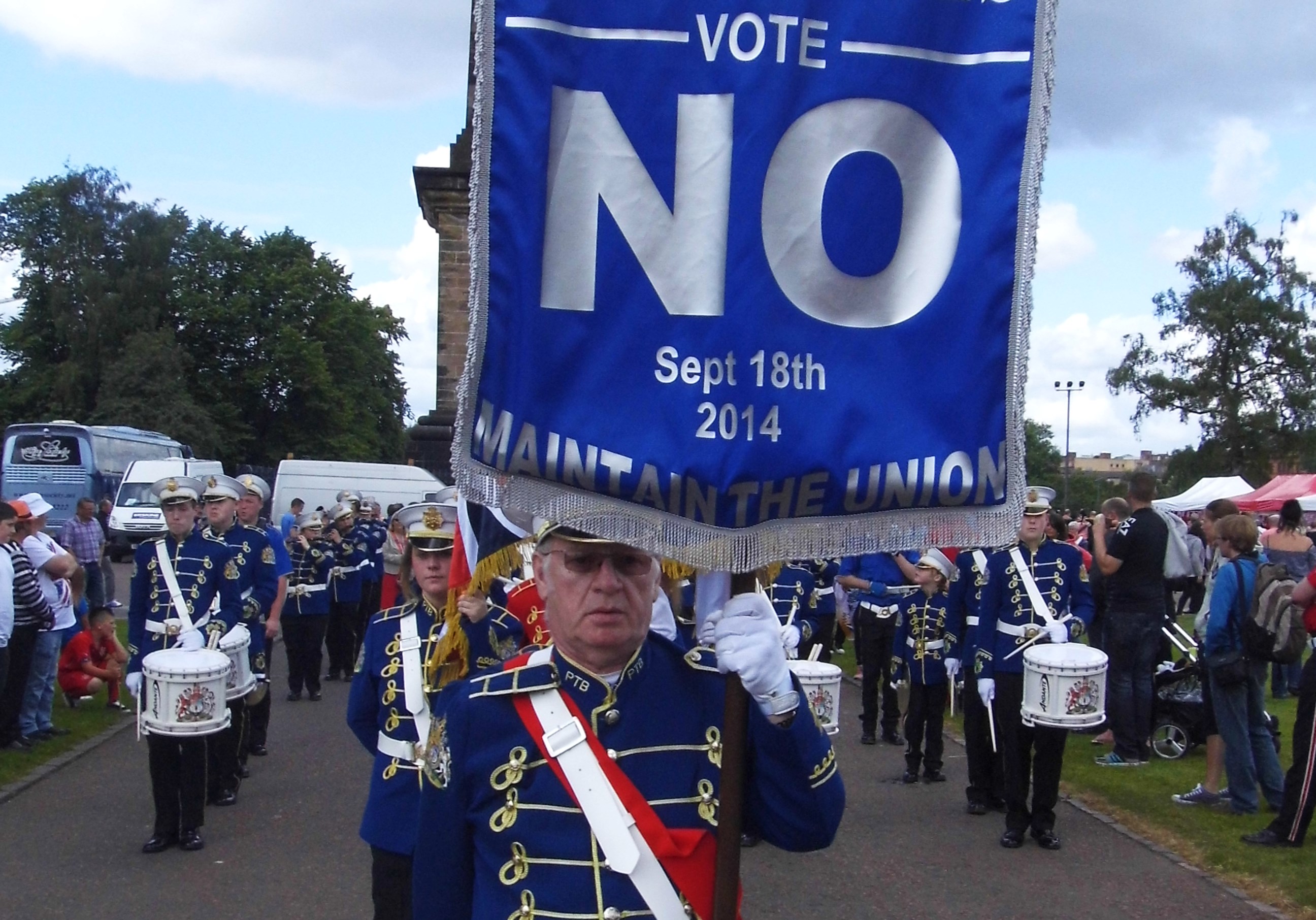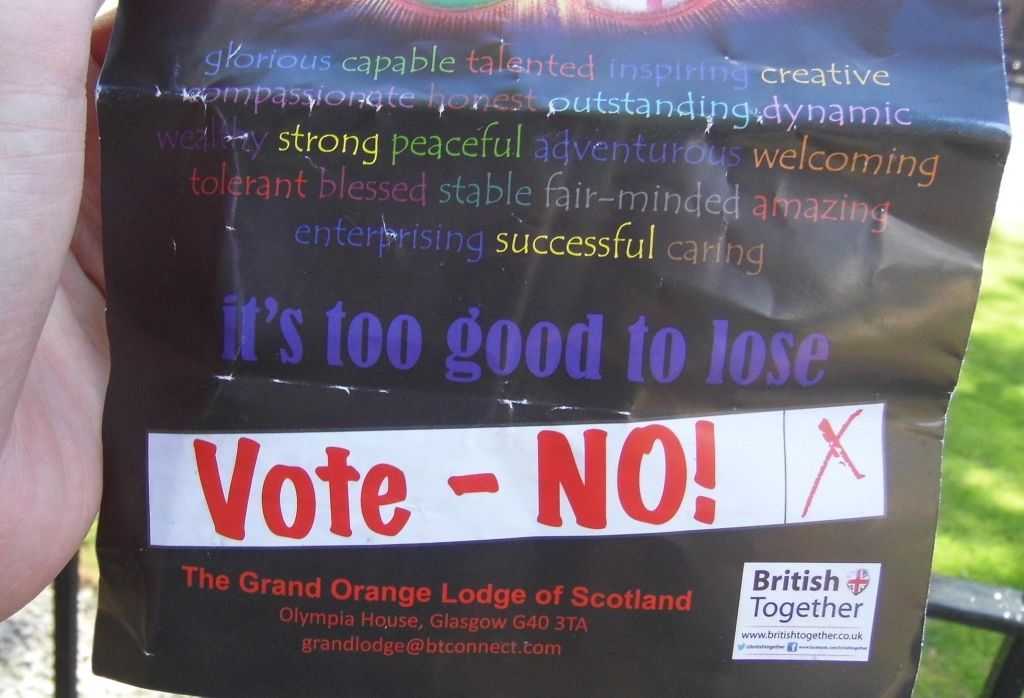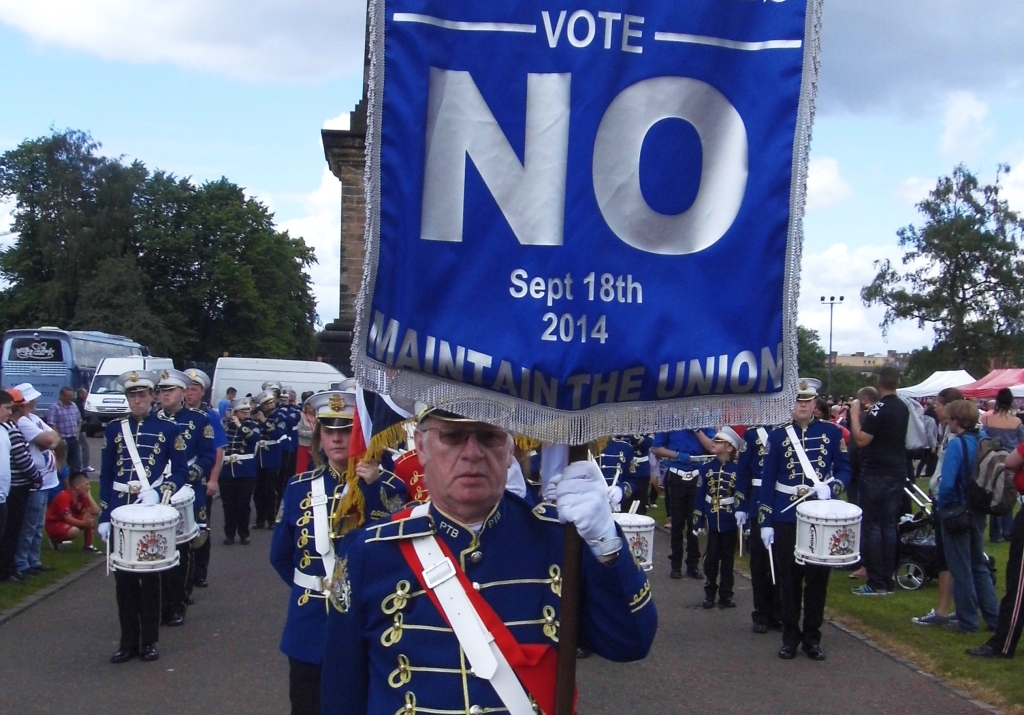JAMES McALEER discusses the future of the Orange Order in Scotland.
Glasgow’s East End in summer can be stunning, but it’s no place to nurse a hangover. Every weekend afternoon is filled with the whistles, drums and Sunday best suits of the Orange Order. Divisive, fiercely Protestant and strongly unionist, the Order is most active during the ‘marching season’, a series of walks primarily in Northern Ireland and Glasgow culminating on the 12th July, the anniversary of William of Orange’s victory over James II way back when. This year, the marches are juxtaposed against two major socio-political events – the Independence Referendum and the Commonwealth Games, each with the potential to exacerbate longstanding issues surrounding the parade. And as calls to close down the parades continue, could 2014 be the Order’s last hurrah in Glasgow?
The Orange Walks and the Independence Referendum
There are only three certainties in Scotland this year: death, taxes and the omnipresence of the Independence Referendum. Campaigners from both sides of the vote have tirelessly canvassed, debated, trolled, protested, donated and recruited in one of the largest and most exciting events in recent Scottish history. Unfortunately, the debate on Scotland’s future could become a political bed-sheet waved at an angry orange bull.
The rub lies in existing issues. For, although the Orange Order may seem little more than silly hats, penny whistles, and a slightly longer journey to work, religious differences have given it a violent side, leading to frequent clashes with the police. As much as the majority of arrests – for drinking in public and antisocial behaviour- can be filed as the inevitable by-product of a large gathering of people on a sunny day in Glasgow, it remains impossible to disguise the link between Orange Order disorder and Sectarianism. ‘Scotland’s Shame’ is a longstanding issue in its largest city, attributed by many to an extremist minority of the Old Firm football clubs’- the traditionally Protestant Rangers and Catholic Celtic – respective fans. With Celtic’s stadium and supporters pubs situated in the East End, the walks are tense affairs at best – and at worst, this tension quickly gets nasty.
As expected, The Order has registered as an official supporter of the No Campaign, actively displaying this in brazen WordArt during marches. Their involvement, it seems, couldn’t be further from ‘compassion, peace and stability’. The warning signs are present: The official Better Together campaign has already publicly distanced itself from the Orangemen; Sam McCrory, widely suspected of plotting to murder senior IRA members, has voiced fears that the Order could disrupt the No campaign by alienating Catholics and centre-left Scots. When a star of Danny Dyer’s Deadliest Men tells you to calm down, it’s obvious there’s a problem.
Unfortunately, The Order could damage more than the No Campaign’s reputation. They already face strong opposition within Glasgow – with a Change.org petition calling for their ban as ‘discriminatory supremacist Orange hate marches’ gathering over 4,500 signatories – and the IndyRef could cause this already overflowing furnace to combust. Indeed, it is not far-fetched to speculate that fears of reactionary violence played a large part in Better Together’s choice to ostracise the Order. Although it has been argued that the order are actually playing the classic antihero in the independence tragic-comedy, enfranchising ‘tens of thousands in housing schemes across the country’ who would previously never bothered to vote, surely there is a better way of doing this than through an organisation built on religious discrimination?
The Orange Walks and the Commonwealth Games
As the locals debate and speculate ahead of September the 18th, Glasgow City Council has been gearing up for the Commonwealth Games. Government funded graffiti, Salmond Cycles and repainted shop-fronts have all emerged as part of an increasingly dubious regeneration programme in the East End and city centre. With less than a month to go until the games begin, the council will be understandably keen to avoid any negative publicity. The marches will be a major cause for concern, and it is likely there will be a heavier police presence in an attempt to deter troublemakers. This creates problems in itself. Publicity for the games, based heavily around the slogan ‘People make Glasgow’ in a bid to present a progressive, united city, seems to be backfiring as GCC continue to disenchant and de-home East End residents; over-policing at the Orange Walk could leave the city appearing divided and its elected officials paranoid. It’s some conundrum, and GCC and Police Scotland will have to be spot on with their crowd control when the 12th of July comes around – even more so than previous years.
Since their conception, the Orange Parades have been a permanent bone of contention in Glasgow. Sympathisers see them as a way of expressing freedom, religious and political pride; others see a volatile and incendiary danger. This year as violence at parades continue, political tensions exacerbated by the IndyRef grow – and with the walks carrying strong potential to disrupt the squeaky-clean Commonwealth image – the bell could finally toll.
Note: Since the time of writing the 12th of July parades and the 2014 Commonwealth Games have passed, thankfully with no major incidents at either event. Nonetheless, no concrete decision has been made on the future of the walks. The points raised in this article are still relevant regarding the walks and their place in the Glaswegian socio-political landscape. Further information on the 2014 games and the walks can be found in the very informative Vice features on Glasgow.
Images from http://athousandflowers.net/







